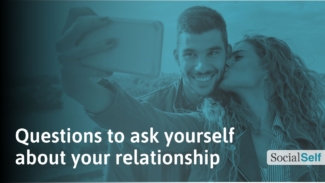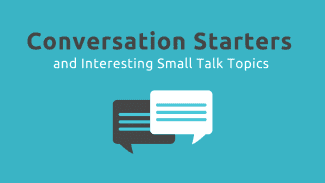Being able to ask better questions can positively influence various aspects of our lives. For example, in a professional setting, asking the right questions during a job interview can help you gain crucial information about company culture while showing the interviewer that you really care. In personal relationships, asking thoughtful questions can foster deeper connections and help you better understand your partner, family members, or friends.
In this article, you’ll get practical advice on how to formulate effective questions, see examples that illustrate the difference between well-crafted and poorly-constructed questions, and identify common mistakes to avoid in the question-asking process.
Sections
- Decide what you need to know
- How to ask good questions
- Common mistakes to avoid when making questions
- Extra tip: know how to use questions to build intimacy
Decide what you need to know
To ask better questions, it’s important to have a clear understanding of what you’re trying to achieve. This will help you frame your questions in a way that allows you to receive the most valuable and relevant information. In this section, we’ll explore several strategies to ensure you’re asking the right questions to get the answers you need.
1. Identify your purpose
Before asking a question, consider your ultimate goal. Are you looking for a solution to a specific problem, gathering opinions, or simply seeking clarification? Understanding your purpose will guide you in formulating questions that will lead to the most helpful responses.
2. Recognize knowledge gaps
Assess what you already know about the topic and identify any gaps in your understanding. This will help you focus on asking questions that address these gaps, ensuring that you gain new insights and move closer to your desired outcome.
3. Prioritize your questions
Once you’ve identified your knowledge gaps, prioritize your questions based on their importance or relevance to your objective. This will help you ask the most crucial questions first and avoid overwhelming your conversation partner with too many inquiries.
4. Determine the level of detail
Consider the level of detail you require in the answers. If you’re looking for a quick overview, ask broad questions; if you need a more in-depth understanding, opt for specific, detailed questions. Tailoring your questions to the appropriate level of detail will help you gather the most useful information for your needs.
5. Be aware of your audience
When asking questions, always consider your audience. What is their background, expertise, and familiarity with the topic? This will help you phrase your questions in a way that is easily understood and elicits the most valuable answers.
6. Refine your question-asking techniques
Lastly, practice, and refine your question-asking techniques. Experiment with different question types (e.g., open-ended vs. closed-ended), learn to listen actively and work on your follow-up questions. This will help you ask better questions, engage in more meaningful conversations, and ultimately, gather the information you need to achieve your goals.
By deciding what you need to know and following these strategies, you’ll be well on your way to asking better questions and reaping the benefits of more insightful and productive conversations.
How to ask good questions
Asking great questions is a skill. You need to make your meaning clear, deliver the question clearly, and make sure you are asking the right person at the right time.
Here’s how to ask better questions that will get you the answers you need.
1. Try not to feel self-conscious
There may have been times when you’ve held yourself back from asking questions because you are worried about looking stupid or ignorant. You might have had thoughts like, “Why don’t I understand this?” or “Everyone else knows what’s going on. What am I missing?”
It may help to remind yourself that nobody knows everything, even if they have a lot of experience or qualifications. It’s perfectly normal and OK to ask questions. Other people in the room might want to ask the exact same question but feel unable to speak up.
If you feel self-conscious about asking questions at work, try to reframe asking questions as part of your job. Remember that you can’t do your work to the best of your ability if you aren’t sure what to do, so it’s vital to get information when you need it. If you’re a student, remember that asking questions in the classroom is expected. It’s a smart way to learn, and your professors will probably appreciate it.
2. Choose the right time to ask your question
Timing is key when it comes to asking good questions. If you ask someone a question when they are busy or stressed, they might feel annoyed and less inclined to answer you.
For example, if your boss is rushing out of the door one morning with a worried look on their face, you probably shouldn’t ask whether a recent controversial rumor about the company is true.
If you aren’t sure whether it’s the right time to ask your question, put yourself in the other person’s shoes. Ask yourself, “Would I want to be asked this question right now?”
There are exceptions to the rule—for example, in an emergency, you may have to ask immediately—but, in general, it’s best to wait until the other person seems calm, or at least not stressed, before engaging with them.
3. Show you’ve already tried to answer the question
If you can show the other person that you’ve tried to research the answer to a question, you’ll probably come across as someone who takes the initiative and tries to think for themselves.
For example, let’s say you’re having trouble with the printer at work. There doesn’t seem to be a manual anywhere in the office, and you can’t find the answer on Google or Quora.
You could say to your colleague or team leader, “The printer keeps jamming for no apparent reason. I’ve tried looking for an online manual or troubleshooting forum, but I can’t find anything useful. What do you think I should try next?”
5. Start a question by stating what you know
Stating what you know before asking a question shows that you already have some knowledge of the problem or situation. This approach can make it easier for the other person to tailor their answer to match your level of understanding.
If applicable, spelling out what you know also shows that you are a good listener and have been paying careful attention to the other person’s opinions, which can make you come across as respectful.
For example, suppose your partner insists that you need to repave the driveway in front of your house because the surface has started to deteriorate. They are adamant that you need to do it by the end of the month.
You can appreciate that the driveway needs fixing, but you aren’t sure why your partner thinks it’s such a critical issue. You could say, “I understand that we need to repave the driveway because the asphalt has started to crack. But why is it so urgent?”
6. Know when to ask open-ended questions
Most questions fall into one of two categories: closed-ended or open-ended. Knowing which style of question to ask can help you get the answer you need.
In general, it’s best to use a closed-ended question when you want someone to share a fact or when you need to get a “Yes” or “No” answer. But if you need to get someone’s opinion or want an in-depth explanation, an open-ended question is probably the right choice.
For example, “Do you like Instagram?” is a closed-ended question because most people will answer “Yes” or “No.”
“What kind of social media, if any, do you like?” is an open-ended question because there are lots of potential answers. For example, the other person could say, “I’m not a big fan of social media, but I use Instagram occasionally,” or “I keep up with family on Facebook, but Twitter is my favorite.”
Our list of examples of open-ended and closed-ended questions may help you decide what type of question you need to ask.
7. Invite the other person to play devil’s advocate
If you’d like someone to give you some feedback on a new idea, you might want to ask, “What do you think?” or “What do you think I could do to improve?” But many people don’t like the idea of giving criticism, so they may hold back because they don’t want to offend you.
An alternative approach is to invite them to play devil’s advocate. If you actively encourage them to look for weaknesses in your ideas, they might feel more comfortable about delivering negative feedback.
For example, you might say, “You’ve said that my new book cover designs are excellent, but if you had to play devil’s advocate, what would you say I could improve?”
Make sure you only use this questioning technique if you’re prepared to accept feedback humbly. You may be surprised by the amount of constructive criticism you get when you reassure someone they don’t have to spare your feelings.
8. Use follow-up questions to gain clarity
Clarifying questions highlight any breakdowns in communication. By simply asking “yes or no” questions, you can check your understanding. This essential technique is particularly useful when you’re talking about a tough topic or discussing something in detail.
For example, suppose someone at work is talking about setting up a budget for new lighting equipment. You think they want a final figure by Monday morning, but you aren’t sure. You could say, “If I’m understanding this correctly, you’re saying that we need to decide on a new budget for the lighting equipment by next Monday, is that right?”
Common mistakes to avoid when making questions
1. Asking vague questions
In general, when you ask a vague question, you are likely to get a vague or irrelevant answer. Vague questions are usually open to interpretation, and the other person may not understand what you need to know.
For example, “Who is the best salesperson on our team?” could invite various answers, depending on what “best” means in this context.
You may think that the best salesperson is the one who made the most money in any given period. However, the person you are asking might think that the best salesperson is the one who retained the company’s highest-value accounts. To avoid misunderstandings, it’s best to be as specific as possible.
To continue the example above, a more helpful question might be, “Which member of our sales team bought in the most money last year?” or “Which of our salespeople signed up the most new customers last month?”
10. Ask one question at a time
Most people find it easier to answer a single question at a time, so do not blend multiple questions together.
For example, instead of asking, “Where is the party and what time does it start?” it would be better to ask, “Where’s the party?” and “What time does it start?” separately.
2. Not paying attention when someone is answering
It is bad manners to ask someone a question and then talk over them when they try to respond. Don’t interrupt someone unless it’s absolutely essential. If you have a tendency to interrupt others, check out our guide on how to stop interrupting when someone is talking.
3. Don’t give the other person enough time to think
If you’ve asked a difficult question, the other person may need some time to come up with a good answer. Give them some space to think. Silence isn’t necessarily awkward. In fact, it can be a positive sign—it suggests that the other person is taking your question seriously.
4. Leave the other person feeling useless
When you ask a question, the other person might not know the answer. However, they may know who you should talk to instead. When someone says, “Sorry, I can’t help you,” try saying, “No problem. Do you know who might be able to help?” or “No worries! Could you point me to anyone who might have that information?”
5. Using an unpleasant tone of voice
Don’t ask questions in a sarcastic or aggressive tone of voice. Others may be less inclined to give you the answers you need if you come across as hostile. Even if you feel annoyed or frustrated, try to ask questions politely and respectfully.
6. Using complicated or technical language
Using complicated words does not necessarily make you sound more intelligent or insightful. People may find it hard to understand you when you use big words, and if it’s not clear what you mean, you probably won’t come across as smart.
Keep your language simple. For example, “Do you have any food allergies?” is better than “Do you need to avoid any allergens?” Even if you are using jargon or highly scientific terms, try to speak plainly whenever you can.
7. Using too much filler language
“Um,” “er,” and other filler words can make you seem less credible. When you ask a question, try to deliver it confidently and get straight to the point.
Do not add extra words to the end of the question. For example, try to avoid saying,
“Sorry if that’s a stupid question,” “I know it’s probably a difficult question to answer,” or “Does that make sense?”
8. Not checking your spelling and grammar
When you’re asking a question online or in an email, double-check your spelling and grammar before posting or sending it. Research suggests that if your message is well-written, other people may be more likely to take it—and you—seriously.[1]
9. Not thanking the other person for their time
When you ask someone a question, you are making a demand on their time and energy, so show good manners by thanking them for their answer.
A simple “Thank you” or “Thanks, I appreciate that” is usually enough. If someone has gone out of their way to find the information you need, acknowledge their effort by saying, “Thank you for taking the time to find the answer for me,” or “I really appreciate the trouble you’ve taken, thanks so much!”
Extra tip: know how to use questions to build intimacy
Psychologist Arthur Aron discovered that asking and answering increasingly personal questions can create a powerful sense of intimacy between two people who don’t know each other.[2]
His findings suggest that if you want to build a closer relationship with someone, it may help to ask them about trivial topics before gradually moving towards deeper questions.
For example, if you are hoping to make an acquaintance into a friend, you could start by talking about where you both live, what your idea of a perfect day is, and what kinds of jobs you do. As you become more comfortable with one another, you could start asking more personal questions, such as their professional ambitions or fondest memories.
If you’re interested in trying this approach, our in-depth article on how to become friends with someone fast contains lots of tips, plus more details of Aron’s research.




























